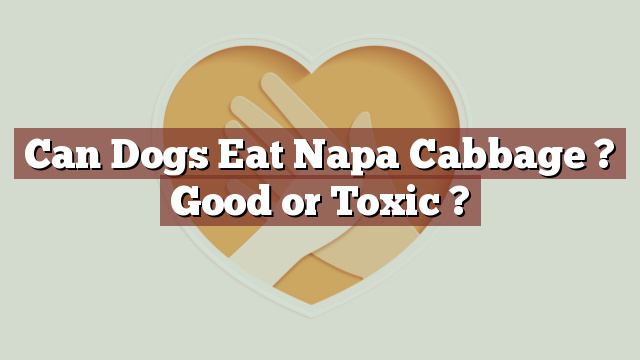Can Dogs Eat Napa Cabbage? Good or Toxic?
As responsible pet owners, it is crucial to be knowledgeable about safe and healthy foods for our beloved dogs. While some human foods can be shared with our furry companions, others may pose potential risks and even be toxic. In this article, we will delve into the topic of whether dogs can safely consume Napa cabbage and explore the nutritional value it holds, any potential risks associated with its consumption, and what steps to take if your dog happens to ingest it.
Nutritional Value of Napa Cabbage: Essential Vitamins and Minerals
Napa cabbage, also known as Chinese cabbage, is widely recognized for its nutritional benefits. This leafy vegetable is low in calories but high in essential vitamins and minerals. It contains significant amounts of vitamin C, vitamin K, vitamin A, potassium, and folate. Additionally, Napa cabbage is a great source of dietary fiber, which aids in promoting healthy digestion.
Can Dogs Eat Napa Cabbage? Safety and Toxicity Explained
Can dogs eat Napa cabbage? The answer is yes, dogs can indeed consume Napa cabbage. This vegetable is generally safe for them and poses no immediate threat to their health. However, as with any new food introduced into a dog’s diet, moderation is key. It is essential to feed Napa cabbage to your furry friend in small amounts and observe their reaction.
While Napa cabbage is generally safe, it is important to note that some dogs may experience digestive issues when consuming certain vegetables, including cabbage. Flatulence, diarrhea, or upset stomach may occur in sensitive individuals. Therefore, it is vital to monitor your dog’s response to Napa cabbage and discontinue feeding if any adverse symptoms arise.
Potential Risks or Benefits of Dogs Consuming Napa Cabbage
When considering the potential risks and benefits of dogs consuming Napa cabbage, it is important to note that every dog is unique. Some dogs may benefit from the nutritional value it provides, while others may experience digestive discomfort or allergies.
As mentioned earlier, Napa cabbage is rich in vitamins and minerals, which can support a dog’s overall health. The high fiber content can aid in maintaining regular bowel movements and digestive health. However, it is crucial to remember that a balanced and complete diet specifically formulated for dogs should always be the primary source of their nutrition.
What to Do if Your Dog Eats Napa Cabbage: Signs, Treatment, and Prevention
If your dog happens to consume Napa cabbage, there are a few steps to take. Firstly, monitor your dog closely for any signs of discomfort or adverse reactions. If your dog experiences vomiting, diarrhea, or any other concerning symptoms, it is crucial to seek immediate veterinary assistance. A vet can properly assess the situation and provide appropriate guidance or treatment if necessary.
In order to prevent potential digestive issues or any unwanted incidents, it is advisable to introduce new foods gradually. This applies to Napa cabbage as well. Start with small amounts and gradually increase the portion size over time. By doing so, you can observe your dog’s response and ensure their well-being.
Conclusion: Moderation is Key, Consult a Vet for Dietary Advice
In conclusion, Napa cabbage can be part of a dog’s diet when fed in moderation. Its nutritional value can provide certain health benefits, but it is important to be aware of potential digestive issues or allergies that may arise in individual dogs. If you are uncertain or have concerns about incorporating Napa cabbage into your dog’s diet, it is always recommended to consult with a veterinarian. They can offer tailored advice based on your dog’s specific needs and ensure their overall well-being. Remember, the key to a healthy and happy dog is a balanced and appropriate diet.
Thank you for investing your time in exploring [page_title] on Can-Eat.org. Our goal is to provide readers like you with thorough and reliable information about various dietary topics. Each article, including [page_title], stems from diligent research and a passion for understanding the nuances of our food choices. We believe that knowledge is a vital step towards making informed and healthy decisions. However, while "[page_title]" sheds light on its specific topic, it's crucial to remember that everyone's body reacts differently to foods and dietary changes. What might be beneficial for one person could have different effects on another. Before you consider integrating suggestions or insights from "[page_title]" into your diet, it's always wise to consult with a nutritionist or healthcare professional. Their specialized knowledge ensures that you're making choices best suited to your individual health needs. As you navigate [page_title], be mindful of potential allergies, intolerances, or unique dietary requirements you may have. No singular article can capture the vast diversity of human health, and individualized guidance is invaluable. The content provided in [page_title] serves as a general guide. It is not, by any means, a substitute for personalized medical or nutritional advice. Your health should always be the top priority, and professional guidance is the best path forward. In your journey towards a balanced and nutritious lifestyle, we hope that [page_title] serves as a helpful stepping stone. Remember, informed decisions lead to healthier outcomes. Thank you for trusting Can-Eat.org. Continue exploring, learning, and prioritizing your health. Cheers to a well-informed and healthier future!

